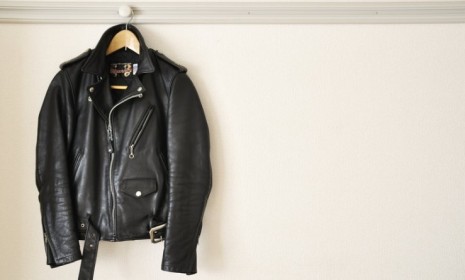Coming soon: A leather jacket grown in a lab?
Growing cowhide without the cow will soon be a possibility, as a new biotech company aims to become the world's first purveyor of in vitro leather goods

A free daily email with the biggest news stories of the day – and the best features from TheWeek.com
You are now subscribed
Your newsletter sign-up was successful
If you fancy the look of a leather jacket but can't stomach the idea of skinning an animal for one, you're in luck. A new biotech company called Modern Meadow hopes that in vitro advancements will have lab-grown leather products on the market in the near future — a move that could dramatically reshape the clothing industry. Here's what you should know:
How will they do it?
The process for creating skin is dissimilar from the process of growing an in vitro burger, which requires muscle meat to be layered together piece by piece. In the case of creating leather in a lab, scientists start with a biopsy from a cow, says Ashley P. Taylor at Discover Magazine. They then "grow the bovine cells in the lab and shape them into sheets of fused cells" with something called a 3D bioprinter, which molds cells into actual tissue. From there, the tissue is nursed in a bioreactor, which supplies the food the cells needs to naturally become skin and muscle. Once that's ready, scientists simply "cut away the meat and tan the hide."
The Week
Escape your echo chamber. Get the facts behind the news, plus analysis from multiple perspectives.

Sign up for The Week's Free Newsletters
From our morning news briefing to a weekly Good News Newsletter, get the best of The Week delivered directly to your inbox.
From our morning news briefing to a weekly Good News Newsletter, get the best of The Week delivered directly to your inbox.
What kind of things will they be able to make?
Shoes, belts, handbags — you name it. "Skin is a simpler structure than meat," says Modern Meadow co-founder Andras Forgacs, and is therefore "easier to produce." The company is hoping to have an in vitro facility up and running within the next five years. Unfortunately, "they didn't say how much leather they were planning to make, or what it might cost," says Discover Magazine's Taylor.
What are the advantages of growing leather in a lab?
It's better for the environment, first of all, since lab-grown leather cuts down on farming space, feed costs, transportation, and expensive factories. "If you look at the resource intensity of everything that goes into a hamburger, it's an environmental train wreck," says Forgacs. The expectation is that these leather goods and future meat products will appeal, at least at first, "to culinary early-adopter consumers and the segment of the vegetarian community that rejects meat for ethical reasons."
A free daily email with the biggest news stories of the day – and the best features from TheWeek.com
Sources: Daily Mail, Discover Magazine, NBC News